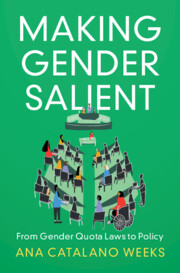Book contents
- Frontmatter
- Dedication
- Contents
- List of Figures
- List of Tables
- Acknowledgments
- 1 Introduction
- 2 When Do Quotas Matter? A Theory of the Substantive Representation of Cross-Cutting Interests
- 3 What Do Women Want? Gender Gaps in Preferences
- 4 The First Stage of Policy Change: The Effects of Quotas on Party Priorities
- 5 The Effects of Gender Quota Laws on Work–Family Policies
- 6 How Gender Quota Laws Change Work–Family Policies
- 7 Conclusion
- Appendix
- References
- Index
6 - How Gender Quota Laws Change Work–Family Policies
Published online by Cambridge University Press: 09 June 2022
- Frontmatter
- Dedication
- Contents
- List of Figures
- List of Tables
- Acknowledgments
- 1 Introduction
- 2 When Do Quotas Matter? A Theory of the Substantive Representation of Cross-Cutting Interests
- 3 What Do Women Want? Gender Gaps in Preferences
- 4 The First Stage of Policy Change: The Effects of Quotas on Party Priorities
- 5 The Effects of Gender Quota Laws on Work–Family Policies
- 6 How Gender Quota Laws Change Work–Family Policies
- 7 Conclusion
- Appendix
- References
- Index
Summary
Chapter 6 compares evidence from qualitative case studies of similar countries that did and did not adopt a quota law, shedding light on the mechanisms linking quotas to policy change and the conditions under which they hold. One of the unique features of quota laws compared to increases in the number of women in parliaments without quotas is that quotas tend to increase the share of women on the right in particular. Quotas thus lead to more women from across the political spectrum entering parliament and, over time, taking on leadership roles. I find that the mechanism of factions (women’s increased leverage within parties and parliament) played an important role in both Belgium and Portugal, as women pushed for greater gender equality in government and formed the majority of a new working group on parenting and gender equality. However, the importance of women as ministers depends on the institutional context: even when quotas increase women in parliaments, they might not increase women in governments. In the counterfactual (non-quota) cases of Austria and Italy, women were often key protagonists in policy reform, but there are fewer of them, especially on the right and far right. This can result in policy stasis or backsliding.
Keywords
- Type
- Chapter
- Information
- Making Gender SalientFrom Gender Quota Laws to Policy, pp. 119 - 159Publisher: Cambridge University PressPrint publication year: 2022

